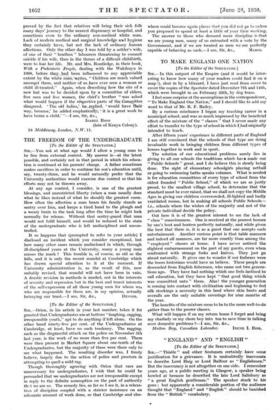THE FREEDOM OF THE UNDERGRADUATE
[To the Edit& of the SPECTATOR.] Snt,—You ask at what age would I allow a young man to be free from external control. My answer is—at the latest possible, and certainly not in that period in which his educa- tion is continued at his parents' charge. A father sometimes makes sacrifices in order to continue his son's education until, say, twenty-three, and he would naturally prefer that the University authorities would exercise due control so that his efforts may not be thrown away.
At any age control, I consider, is one of the greatest blessings, and unrestricted liberty (when a man usually does what he likes instead of what he should) the greatest curse. How often the affection a man bears his family stands as sentry over him, and keeps a tired hand to the plough and a weary brain to the task long after the time he might look normally for release. Without that sentry-guard that man would not fulfil himself, and would be reduced to the state of the undergraduate who is left undisciplined and uncon- trolled.
It so happens that (prompted to refer to your article) I disclosed an incident which you consider exceptional, but how many other cases remain undisclosed in which, through ill-disciplined years at the University, many a young man misses the mark ? This trouble is, of course, as old as the hills, and it is only the recent scandal at Cambridge which has drawn special attention to it at the moment. If University administration is, as the result of this, now suitably revised, that scandal will not have been in vain. A drastic revision in methods is needed, not in the interests of severity and repression but in the best and truest interests of the self-expression of all those young men for whom wet who are responsible for them are, in my opinion, actually betraying our trust.—I am, Sir, &c., DEVOIR.


















































 Previous page
Previous page